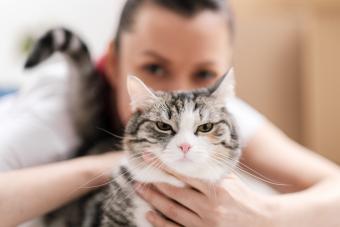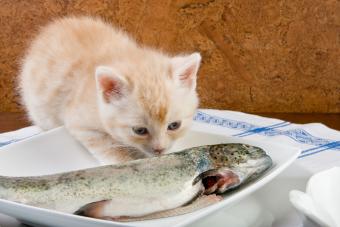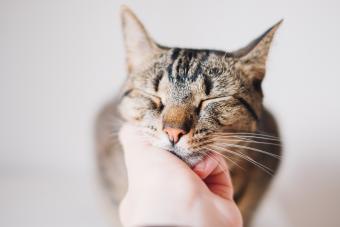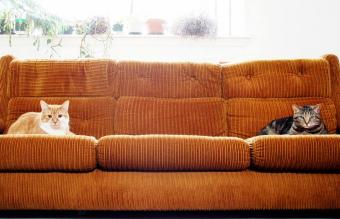Smells Cats Hate

Did you know there are smells that cats hate? Cats have very sensitive noses, and even a slightly unpleasant smell can cause them to recoil in distaste. Also, remember that cats do not like the same smells that people do, so while you might really love that expensive perfume that you bought at the local boutique, your cat's sensitive nose might not be able to handle your intense scent.
The Litter Box

Perhaps one of the smells that cats hate the most is a dirty litter box. If your litter box hasn't been cleaned in a while, your cat might rebel and start using the restroom in another place that is less appropriate. Make sure that the litter box is clean if you want your cat to use it!
Other Cats

While cats don't necessarily mind the smell of cats they are familiar with, the smell of a new cat in the household can send your feline into a tizzy. Worse yet, the "new cat smell" can cause your original cat to spray the house. That's a smell no one likes!
Bad Fish

While cats and people are very different, one thing they can agree on is that the smell of bad fish is unpleasant. Do not try to feed your cat fish - or any other meat, for that matter - that has spoiled. They won't like it, and even if you do manage to get them to eat it, it might make them sick.
Certain Fruits and Vegetables

While fruits and vegetables might smell good to people, cats have another opinion altogether. Some varieties of produce, such as tomatoes, onions, and garlic, can send your cat's olfactory system reeling.
Bananas

Cats really dislike the smell of bananas and it may be due to the ethyl acetate in banana peels. They are repulsed by the chemical smell of the compound. Try rubbing banana peels on furniture that you want them to stay away from.
Citrus Fruits

Another type of fruity smell that cats hate is any type of citrus fruit. In fact, one way to keep cats out of certain places is to spray a citrus spray around the area to discourage their presence!
Fresh Mint

Mint is another naturally occurring scent that cats avoid in all of its forms, including menthol. Cats can find inhaling this scent very irritating to their noses. Mint can also be toxic to cats, although a cat has to eat quite a lot of it to become ill.
Household Cleaners

Aside from most being toxic if ingested, cats do not like the odor from common household cleaning chemicals. This includes soaps and air fresheners. The chemicals in these cleaners are too much for your cat's sensitive nose and they will avoid areas where they have been sprayed. This is why it's important to use gentle cleaners for your cat's litter box.
Spicy Peppers

Cats are not fans of spicy food or scents, so anything with a "kick" to it will not please your kitty. Peppers in fresh and ground form are avoided by cats. Cats can eat sweeter varieties of peppers, though, like bell peppers.
Sign up for our newsletter featuring all the latest stories and products we love.
Lavender

A cat's sensitive sense of smell is irritated by many floral scents. Lavender, while lovely to humans, is very unappealing to cats. You can use it as a deterrent, but be careful, as too much lavender can be toxic for cats.
Coffee

You might savor the scent of your morning cup of joe, but your cat will instinctively turn up their nose at the smell of coffee. Whether it's grounds, beans, or freshly brewed coffee, the smell is one cats hate. Cats react negatively to caffeine, so coffee is toxic for them to ingest.
Vinegar

Vinegar is a strong and sour scent that cats detest. While vinegar isn't toxic to cats, the offensive smell will keep most cats from getting too close. In fact, it can be used as a safe household cleaner to remove persistent stains and odors, although you should use caution when using it in areas your cat frequents. While the scent will fade for you, the smell may be too overwhelming for your cat, and they may avoid the cleansed area or even mark on it to combat the smell.
Cats and Smell

Cats noses are very sensitive, but with a little forethought, you can make your house a pleasant olfactory experience for the both of you. Remember that your cat is close to the ground, so avoid using strong smelling or toxic chemicals to clean the floors. Also, avoid spraying strong perfumes or chemicals anywhere near your cat; if you can smell it, it's one hundred times worse for them! However, you can turn a cat's sense of smell to your own advantage by making your own natural cat repellent.







